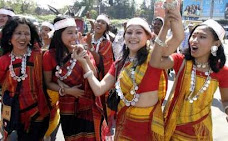Sources- http://www.thedailystar.net/story.php?nid=49593
Speakers at a seminar yesterday called for protecting indigenous people to save forests of the country.
They said the indigenous people are the part of the forests and they know how to protect them.
The seminar titled 'Environmental degradation in forest: Socio-economic crisis of indigenous people' was organised by the Bangladesh Paribesh Andolon (Bapa) at WVA auditorium in the city.
Speaking as chair Bapa President Prof Muzaffer Ahmad said there is a debate over the name of Adibashi but there is no debate about it that those who live in forests also protect them.
"Those who consider forests as the raw materials of industrialisation do not protect them," he said.
The existence of Adibashi people is being threatened in the name of participatory forests, he added.
In a keynote paper, Prof Khandaker Mokaddem Hossain of Dhaka University said the ethnic communities constitute, according to a government statistics, about 1.2 percent of the total population, but the actual number of indigenous people is considerably higher than this.
He said a huge number of Bangalee settlers have been rehabilitated at Matiranga and Ramgarh thanas in Khagrachhari district, Lama thana in Bandarban district, and Madhupur Tracts of Tangail and Mymensingh districts.
As a consequence, the indigenous people have become marginalised and lost their traditional rights over land and trees, he said.
Prof Hossain said the government should implement ILO's Indigenous and Tribal Peoples Convention 169 to protect their human and land rights.
He said the land and tree resources of indigenous people should be protected from the activities that are not sound environmentally.
Apart from the rehabilitation of Bangalee settlers and commercial plantation of tea, pineapple, orange, lemon and rubber trees, infrastructural development including construction of roads, bridges and highways, industrialisation and urbanization process, and control of forest lands by military and para-military troops in Chittagong Hill Tracts are the main causes of deforestation.
Philip Gain, director of SHED, said the aggression of alien trees in forest is not acceptable.
There were 100 species of indigenous trees in Madhupur forest but in the name of participatory afforestation these trees have been replaced by acacia and eucalyptus, he said.
If the government does not take adequate steps it will be very difficult for indigenous people to survive, said Rabindranath Soren, a leader of the Adibashi community.
AZM Shamsul Huda, a retired forest conservator, said indigenous people do not make any harm to forests, and during his service he did not find them in selling tress by cutting them illegally.
skip to main |
skip to sidebar

Military enforcement

Survive

Torture

Raped & Killed Indigenous Jumma Women

Militarization in CHTs

Religious destruction

Land Grabbing

Indigenous Jumma Villeges burnt down

Atrocities


CHTs is a number one of Millitary Zone in the World.

With Traditional Dress
nandawansa

Military enforcement

Survive

Torture

Raped & Killed Indigenous Jumma Women

Militarization in CHTs

Religious destruction

Land Grabbing

Indigenous Jumma Villeges burnt down

Atrocities
Embassy in Los Angeles
About Bangladesh
Refugee in Homeland

News Papers
Audio & Video
Actrocities & Tortures

CHTs is a number one of Millitary Zone in the World.
Jumma Photo Albums
Jumma Links
Jumma Women

With Traditional Dress
Blog Archive
About Me
- IJPNUSA
- The Indigenous Jumma People Net in North America is for the movement of minority Jumma indigenous people in Chittagong Hill Tracts in Bangladesh. E-mail:jpnus@yahoo.com Webpage:-http://jummapeoplenet.blogspot.com/
